Dear Friends,
Greetings from the desk of Tricontinental: Institute for Social Research.
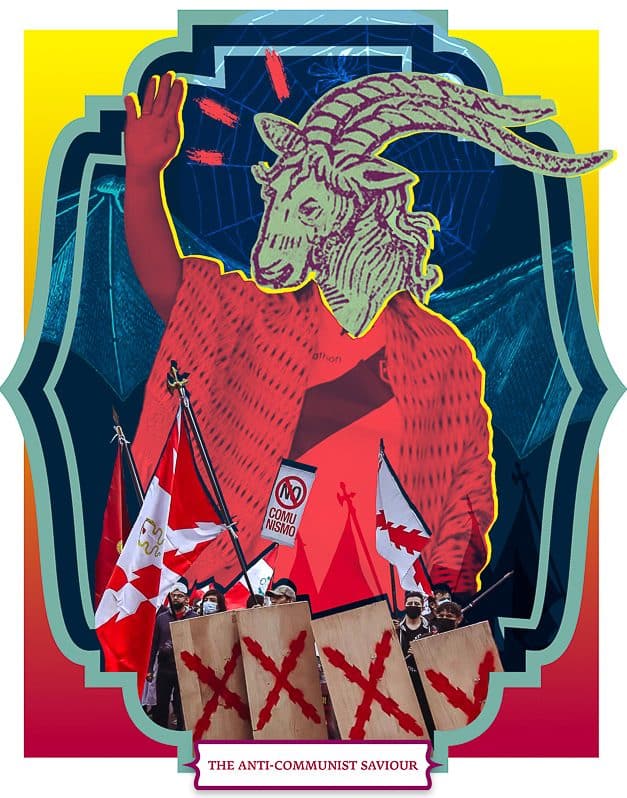
There has been widespread consternation about how to understand Donald Trump’s emergence as a serious candidate for U.S. president since 2016. Far from an isolated phenomenon, Trump rose to power alongside other strongmen such as Viktor Orbán (prime minister of Hungary since 2010), Recep Tayyip Erdoğan (president of Turkey since 2014), and Narendra Modi (prime minister of India since 2014). People like this, who came to power and cemented their rule through liberal institutions, seem to be impossible to permanently remove through the ballot box. It has become clear that a rightward shift is taking place in liberal democratic states, whose constitutions emphasise multi-party elections while allowing the space for one-party rule to be gradually established.
The concept of liberal democracy was and is a highly contested concept that emerged from European and U.S. colonial powers in the 18th and 19th centuries. Its claims of internal pluralism and tolerance, the rule of law, and the separation of political powers came at the same time as its colonial conquests and its use of the state to maintain class power over its own societies. Liberalism today cannot be easily reconciled with the fact that the North Atlantic Treaty Organisation (NATO) countries account for 74.3% of world military spending.
Countries with constitutions that emphasise multi-party elections have increasingly seen the gradual establishment of what is effectively one-party rule. This one-party rule may at times be masked by the existence of two or even three parties, concealing the reality that the difference between these parties has become increasingly negligible.
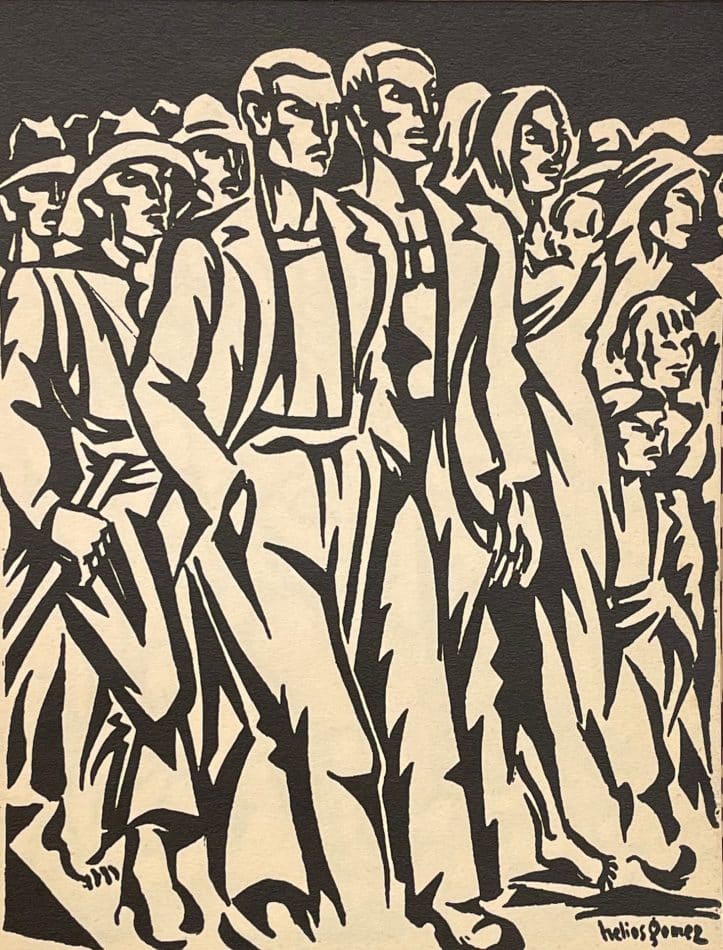
Helios Gómez (Spain), Viva octubre (Long Live October), 1934.
It has become apparent that a new kind of right wing has emerged not only through elections but by exerting dominance in the arenas of culture, society, ideology, and the economy, and that this new kind of right wing is not necessarily concerned with overthrowing the norms of liberal democracy. This is what we called ‘the intimate embrace between liberalism and the far right’, following the writings of our late senior fellow Aijaz Ahmad.
The formulation of this ‘intimate embrace’ allows us to understand that there is no necessary contradiction between liberalism and the far right and indeed that liberalism is not a shield against the far right, and certainly not its antidote. Four theoretical elements are key to understanding this ‘intimate embrace’ and the rise of this far right of a special type:
- Neoliberal austerity policies in countries with liberal electoral institutions vanquished the social welfare schemes that had allowed liberal sensibilities to exist. The state’s failure to take care of the poor turned into a harshness toward them.
- Without a serious commitment to social welfare and redistributionist schemes, liberalism itself drifted into the world of far-right policies. These include increased spending on the internal repressive apparatus that polices working-class neighbourhoods and international borders alongside the increasingly stingy distribution of social goods, disbursed only if the recipients allow themselves to be stripped of basic human rights (such as by ‘agreeing’ to the obligatory use of birth control).
- In this terrain, the far right of a special type found that it became more and more accepted as a political force given the turn by the parties of liberalism to the policies for which the far right had advocated. In other words, this tendency to draw from far-right policies allowed the far right to become mainstream.
- Finally, the political forces of liberalism and the far right unified across the board to diminish the left’s grasp on institutions. The far right and its liberal counterparts have no fundamental economic differences regarding class. In the imperialist countries, there is a very high confluence of viewpoints on maintaining U.S. hegemony, hostility and contempt for the Global South, and increased jingoism, as seen by the full-throttled military support for the genocide Israel is conducting against Palestinians.

After the defeat of Italian, German, and Japanese fascism in 1945, commentators in the West worried about the incubation of the far right in their societies. Most Marxists, meanwhile, recognised that the far right had not emerged out of nothing, but out of the contradictions of capitalism itself. The collapse of the Third Reich was only a phase in the history of the far right and the development of capitalism: it would emerge again, perhaps wearing different clothes.
In 1964, the Polish Marxist Michał Kalecki wrote the stimulating article ‘The Fascism of Our Times’ (‘Faszyzm naszych czasów’). In that essay, Kalecki said that the new kinds of fascistic groups that were emerging at the time appealed ‘to the reactionary elements of the broad masses of the population’ and were ‘subsidised by the most reactionary groups of big business’. However, Kalecki wrote, ‘the ruling class as a whole, even though it does not cherish the idea of fascist groups seizing power, does not make any effort to suppress them and confines itself to reprimands for overzealousness’. This attitude persists today: the ruling class as a whole fears not the rise of these fascist groups, but only their ‘excessive’ behaviour, while the most reactionary sections of big business support these groups financially.

Mario Schifano (Italy), No, 1960.
A decade and a half later, when Ronald Reagan seemed to be on the threshold of becoming the president of the United States, Bertram Gross published Friendly Fascism: The New Face of Power in America (1980), which drew liberally from The Power Elite (1956) by C. Wright Mills and Monopoly Capital: An Essay on the American Economic and Social Order (1966) by Paul A. Baran and Paul M. Sweezy. Gross argued that since large monopolistic firms had strangled democratic institutions in the United States, the far right did not require jackboots and swastikas: this orientation would come through the very institutions of liberal democracy. Who needs tanks when you have the banks to do the dirty work?
The warnings of Kalecki and Gross remind us that the intimacy between liberalism and the far right is not a new phenomenon but one that emerges from deep within liberalism’s capitalist origins: liberalism was never going to be anything but the friendly face of capitalism’s normal brutality.
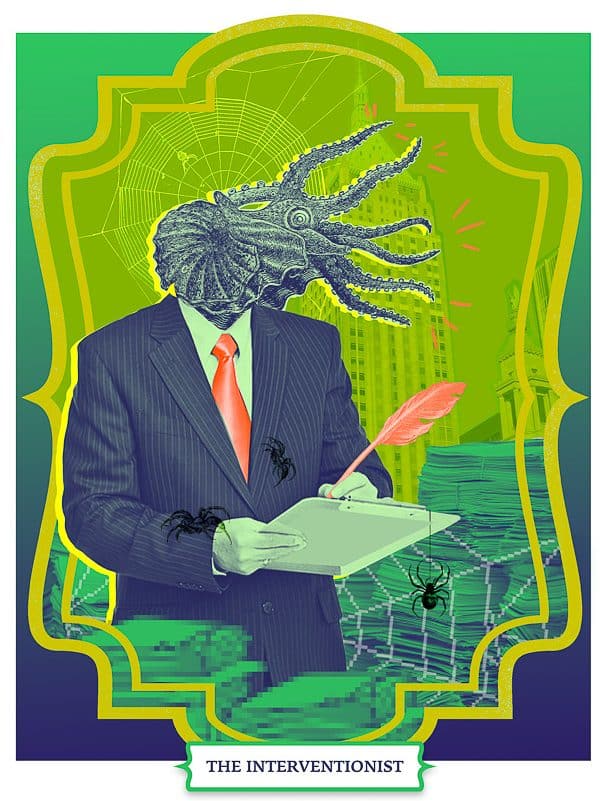
Liberals are using the word ‘fascism’ to distance themselves from the far right. This use of the term is more moralistic than precise since it denies the intimacy between liberals and the far right. To that end, we have formulated ten theses on this far right of a special type, which we hope will provoke discussion and debate. This is a provisional statement, an invitation to a dialogue.
Thesis One. The far right of a special type uses democratic instruments as much as possible. It believes in the process known as the ‘long march through the institutions’, through which it patiently builds political power and staffs the permanent institutions of liberal democracy with its cadre, who then push their views into mainstream thought. Educational institutions are also key to the far right of a special type since they determine the syllabi for students in their respective countries. There is no need for this far right of a special type to set aside these democratic institutions as long as they provide the path to power not just over the state, but over society.
Thesis Two. The far right of a special type is driving the attrition of the state and transferring its functions to the private sector. In the United States, for instance, its proclivity for austerity is helping gut the quantity and quality of cadre in core state functions, such as the U.S. Department of State. Many of the functions of such institutions, now privatised, instead take place under the auspices of non-governmental organisations led by newly emergent billionaire capitalists such as Charles Koch, George Soros, Pierre Omidyar, and Bill Gates.
Thesis Three. The far right of a special type uses the repressive apparatus of the state as much as is legally permissible to silence its critics and demobilise movements of economic and political opposition. Liberal constitutions provide wide latitude for this kind of use, which liberal political forces have taken advantage of over time to quell any resistance from the working class, peasantry, and left.
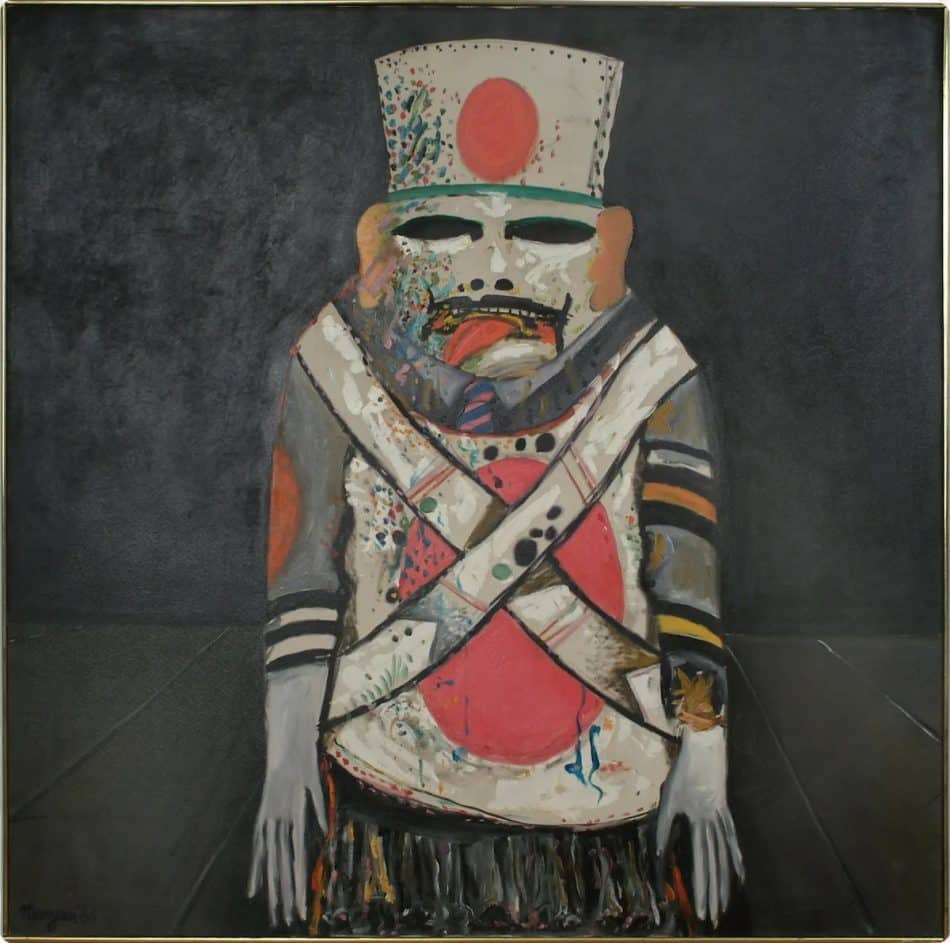
Maryan (Poland), Personnage (Character), 1963.
Thesis Four. The far right of a special type incites a homeopathic dose of violence in society by the more fascistic elements within its political coalition to create fear, but not enough fear to turn people against it. Most middle-class people the world over seek convenience and are disturbed by inconvenience to themselves (such as that produced by riots, etc.). But, on occasion, an arms-length assassination of a labour leader or an arms-length threat made to a journalist is not blamed on the far right of a special type, which often hastily denies any direct association with the fringe fascistic groups (which are nonetheless linked organically to the far right).
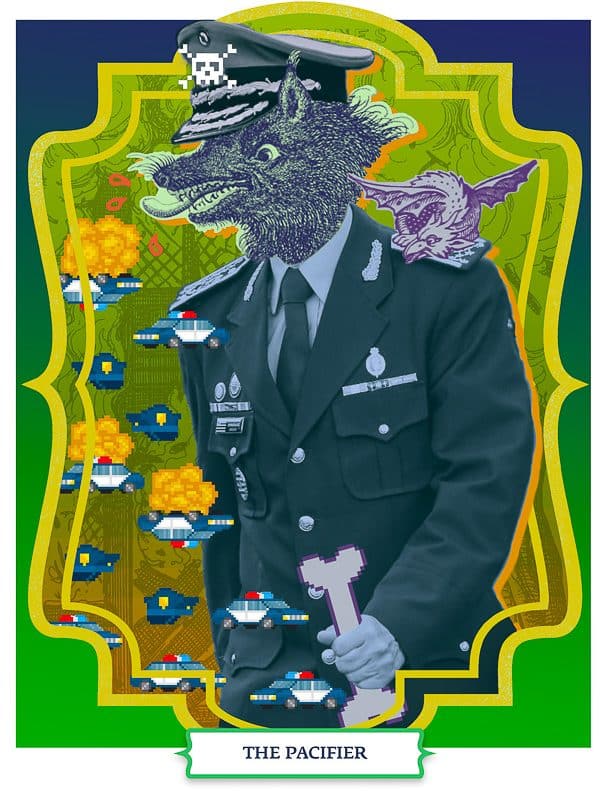
Thesis Five. The far right of a special type provides a partial answer to the loneliness that is woven into the fabric of advanced capitalist society. This loneliness stems from the alienation of precarious working conditions and long hours, which corrode the possibility of building a vibrant community and social life. This far right does not build an actual community, except when it comes to its parasitic relationship with religious communities. Instead, it develops the idea of community, community through the internet or community through mass mobilisations of individuals or community through shared symbols and gestures. The immense hunger for community is apparently solved by the far right, while the essence of loneliness melts into anger rather than love.
Thesis Six. The far right of a special type uses its proximity to private media conglomerates to normalise its discourse and its proximity to the owners of social media to increase the societal acceptance of its ideas. This highly agitational discourse creates a frenzy, mobilising sections of the population either online or in the streets to participate in rallies where they nonetheless remain individuals rather than members of a collective. The feeling of loneliness generated by capitalist alienation is dulled for a moment, but not overcome.
Thesis Seven. The far right of a special type is a tentacular organisation, with its roots spread across various sectors of society. It operates wherever people gather, whether in sports clubs or charitable organisations. It aims to build a mass base in society rooted in the majority identity in a given place (whether race, religion, or a sense of national being) by marginalising and demonising any minority. In many countries, this far right relies upon religious structures and networks to ever-more deeply embed a conservative view of society and the family.
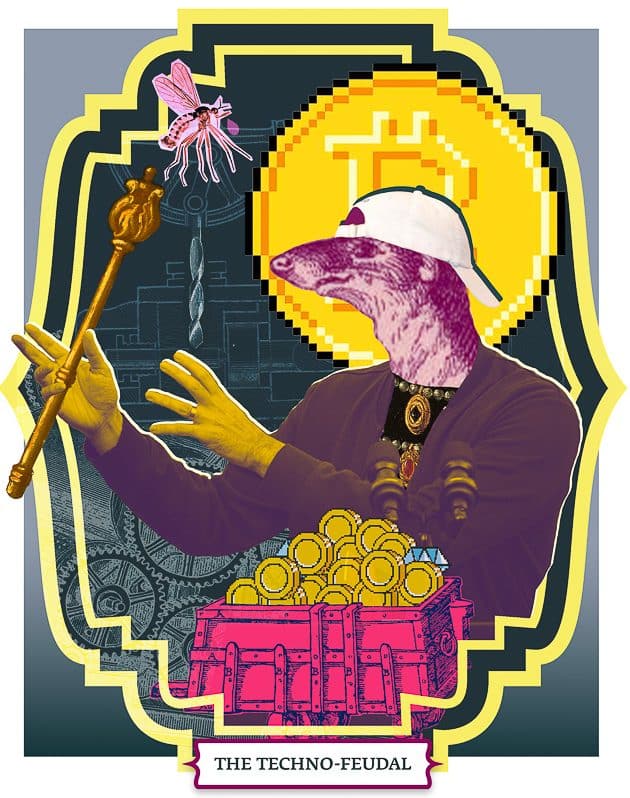
Thesis Eight. The far right of a special type attacks the institutions of power that are the very foundation of its socio-political basis. It creates the illusion of being plebian rather than patrician, when in fact it is deep in the pockets of the oligarchy. It creates the illusion of the plebian by developing a highly masculine form of hyper-nationalism, the decadence of which drips out in its ugly rhetoric. This far right straddles the testosterone power of this hyper-nationalism while playing up its portrayed victimhood in the face of power.
Thesis Nine. The far right of a special type is an international formation, organised through various platforms such as Steve Bannon’s The Movement (based in Brussels), the Vox party’s Madrid Forum (based in Spain), and the anti-LGBTQ+ Fellowship Foundation (based in Seattle, Washington). These groups are rooted in a political project in the Atlantic world that enhances the role of the right wing in the Global South and provides them with the funds to deepen right-wing ideas where they have little fertile soil. They create new ‘problems’ where they did not exist at this scale before, such as the fanfare over sexuality in eastern Africa. These new ‘problems’ weaken peoples’ movements and tighten the right’s grip over society.
Thesis Ten. Though the far right of a special type might present itself as a global phenomenon, there are differences between how it manifests in the leading imperialist countries versus the Global South. In the Global North, both liberals and the far right vigorously defend the privileges that they have gained through plunder over the past five hundred years—through their military and other means—while in the Global South the general tendency amongst all political forces is to establish sovereignty.
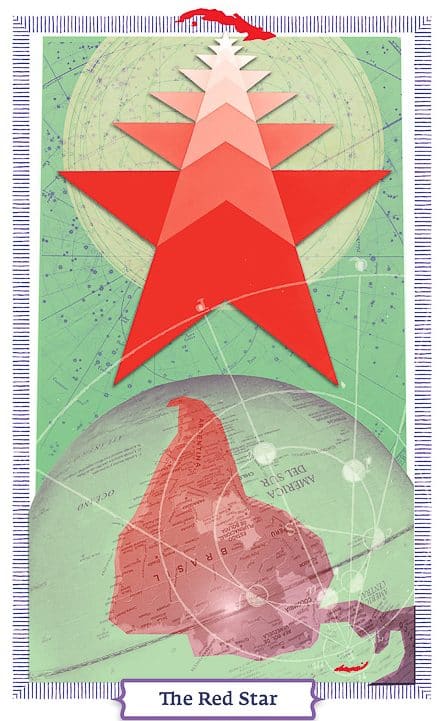
The far right of a special type is emerging in a period defined by hyper-imperialism to mask the actuality of hideous power and pretend that it cares about the isolated individuals that it instead harms. It knows human folly well and preys on it.
Warmly,
Vijay
P.S. Unless otherwise noted, the art in this newsletter comes from the dossiers New Clothes, Old Threads: The Dangerous Right-Wing Offensive in Latin America (2021) and What Can We Expect from the New Progressive Wave in Latin America? (2023).

